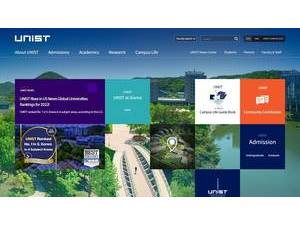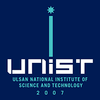
University Overview
Founded in 2009, Ulsan National Institute of Science and Technology is a non-profit public higher education institution located in the large town of Eonyang (population range of 10,000-49,999 inhabitants), Ulsan. Officially recognized by the Ministry of Education of Korea, Ulsan National Institute of Science and Technology (UNIST) is a small-sized (uniRank enrollment range: 3,000-3,999 students) coeducational South Korean higher education institution. Ulsan National Institute of Science and Technology (UNIST) offers courses and programs leading to officially recognized higher education degrees in several areas of study. See the uniRank degree levels and areas of study table below for further details. This 16-year-old South Korean higher-education institution has a selective admission policy based on entrance examinations. UNIST also provides several academic and non-academic facilities and services to students including a library, housing, financial aid and/or scholarships, as well as administrative services.
University Snapshot
Control
![]() public
public
Entity
![]() non-profit
non-profit
Size
![]() small-sized
small-sized
Selectivity
![]() not reported
not reported
University Identity
| Name | Ulsan National Institute of Science and Technology |
|---|---|
| Name (English) | n.a. |
| Name (Non Latin) | 울산과학기술대학교 |
| Acronym | UNIST |
| Founded | 2009 |
| Motto | First in Change |
| Colours | UNIST navy and UNIST emerald |
| Mascot | |
| Screenshot |  |
| Video Presentation | n.a. |
University Location
| Address | 100 Banyeon-ri Eonyang 689-798 Ulsan Korea |
|---|---|
| Location Map and Satellite View | |
| (52) 217 0114 | |
| (52) 217 0009 | |
| Other locations |





Social Media
Official Social Media Channels
Ulsan National Institute of Science and Technology's Facebook page review
n.a.
Ulsan National Institute of Science and Technology's Youtube page review
Ulsan National Institute of Science and Technology's Instagram page review
Ulsan National Institute of Science and Technology's official LinkedIn profile
n.a.
Related Guide Articles
Social media can be a powerful tool for Universities to communicate with current students, alumni, faculty, staff and the wider community. But how can social media be important for prospective students? Read our article about the importance of Social Media for universities and prospective students to learn more.